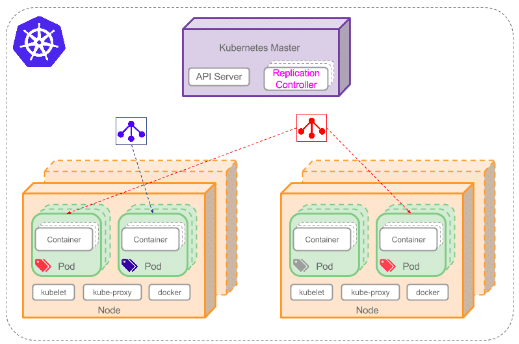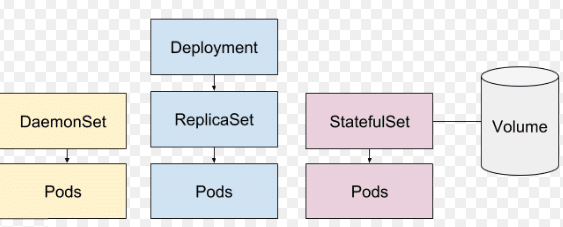What is Kubernetes? What are the Kubernetes’ core concepts? Understanding the Kubernetes concepts is very important. Besides core concepts, there are basic, advanced, and networking concepts of Kubernetes.
Must Read: How to Improve Your Kubernetes Security
What is Kubernetes?

Kubernetes is an orchestrated platform for managing containerized applications in production. What is Kubernetes for real? The name originated from Greek, and it means a pilot or helmsman. In short form, Kubernetes is referred to as K8s. What is Kubernetes used for? You will find a later discussion about that. Kubernetes is all about reducing the complexity that comes with digital transformation. The platform provides clear points to an interface, where the development environment for your application is experienced.
Why is Kubernetes necessary?
The use of Kubernetes is necessary because it initiates the automatic scaling of applications, increased security, and reduced downtime. There is no more writing of scripts for checking, restarting, and changing the required number of Docker containers. You only need to tell K8s the number of containers that you desire, and it will do the rest of the work. Kubernetes can automatically scale your containers, depending on the available resources. However, Kubernetes might not make a lot of sense for the basic and static website that gets a few visitors per day. The use case for Kubernetes might be for larger applications, which can scale down or up quickly.
What is Kubernetes used for?

Kubernetes is used for scaling applications up and down while rolling deployments and managing the services that are expected to respond to specific requests. The concept of Kubernetes can also provide an extensible framework, which is an option for delivering digital transformation. Perhaps, the main task of Kubernetes service is to manage containers while ensuring zero-downtime for your pod.
What are the Kubernetes concepts?
What is Kubernetes? What are its core concepts? What is Kubernetes used for? Kubernetes provides the building blocks and fundamentals for constructing a suitable platform for your team to develop and maintain. Getting to grips with Kubernetes can also be extremely hard, and this is contributed by a lot of information floating around the seas of the internet. In that case, understanding the concepts of Kubernetes is important to your business.
Now, let’s have a look at the core concepts of Kubernetes.
Containers
A container is an executable and stand-alone piece of software that includes everything required for running it. The items within the containers include libraries, code, or anything that support external dependencies. In that case, a container ensures that what is being run is identical even if the operation is done in a different environment. Such a process is possible by isolating the running code from the execution context.
Deployment
The concept is helpful when it comes to making a stateless application that will operate continuously like an HTTP server. Deployments will always allow your system to update a running application without experiencing downtime. The concept also specifies a strategy that will help to restart pods whenever they die. Creating deployment is very simple. You need a configuration file or a command line.
ReplicaSet
The Deployment will always develop a ReplicaSet that will ensure that your application has the required number of Pods. Similarly, ReplicaSets will create and scale Pods, depending on the number of triggers specified by your Deployment. Even though replication controllers are considered old school, they tend to perform similar functions to ReplicaSets. Currently, ReplicaSets are the smart options for managing replicated Pods.
Service
A service can provide static IP addresses for more than two pod instances. Furthermore, one deployment might include more than two identical pods. For any user who is not an insider, accessing any pod is considered to be the same, and thus load balancing is necessary. Service is the abstraction feature in Kubernetes that replaces a terminated pod with a new one. In that case, Kubernetes supports several ingress modes for services, and they include NodePort, LoadBalancer modes, and ClusterIP.
The Kubernetes Basic Concepts. Are they Pods?
Pods are the primary objects that are found in Kubernetes. Furthermore, a pod is a collection of containers, which have shared storage and network. The pod also specifies how the containers are run with the shared network and storage. Each pod has its IP address. The IP address is shared by the containers within the pod, including port space, as they try to find one another through the localhost. Pods handle secrets, volumes, and necessary configuration for containers. However, they are ephemeral and always intended to be restarted whenever they die automatically.
What is Kubernetes without pods? Perhaps, pods are replicated whenever an application is scaled horizontally by the ReplicationSet. In that case, every pod will always operate the same container code.
The Known Kubernetes advanced concepts
Probably, you have some knowledge of Kubernetes’ basic concepts but not advanced concepts. Let’s have a look at some of the Kubernetes advanced concepts.
- ConfigMap – the concept indicates that Kubernetes can store configuration in the application environment.
- Secrets – these concepts are similar to ConfigMap.
- Daemon set – ensures that all nodes operate on a specific pod.
- Ingress– isolate pods and services from internet traffic.
Top advantages of Kubernetes networking concepts
Kubernetes networking concepts are part of cluster master subprocesses. Let’s have a brief discussion at each one of them.
- API Server – responsible for exposing the K8s API.
- Etcd – the distributed key-value store for the cluster state data.
- Scheduler – responsible for selecting the nodes for new pods.
- Kube-controller-manager – the process responsible for running controls while the main aim is to handle tasks within the cluster background.
- Cloud-controller-manager – runs the controllers, which interact with the cloud service provider.
Alpacked company and Kubernetes
Alpacked is an organization with certified specialists who provide professional Kubernetes management, consulting, and deployment services for containerized workloads. The Kubernetes services offered by Alpacked are well managed to avoid issues relating to k8s clusters while running your operations. In that case, you can achieve your operations 24/7 without experiencing any downtime. Some of the Alpacked Kubernetes benefits include:
- Load balancing.
- Customization.
- Quick regeneration.
- Configuration and secret management
- Automatic resource management.
Bottom of the Line
The future of many businesses relies on Kubernetes, which have proven to be a platform for automating the orchestration of containers. The implementing organization will experience applications that run at scale on the myriad of platforms. Your systems will have the opportunity of containing a mix of operating systems and processor architectures. By using its core concepts, Kubernetes can help you schedule your pods into appropriate Nodes. With Kubernetes, your business is bound to experience higher hardware capacity utilization.

